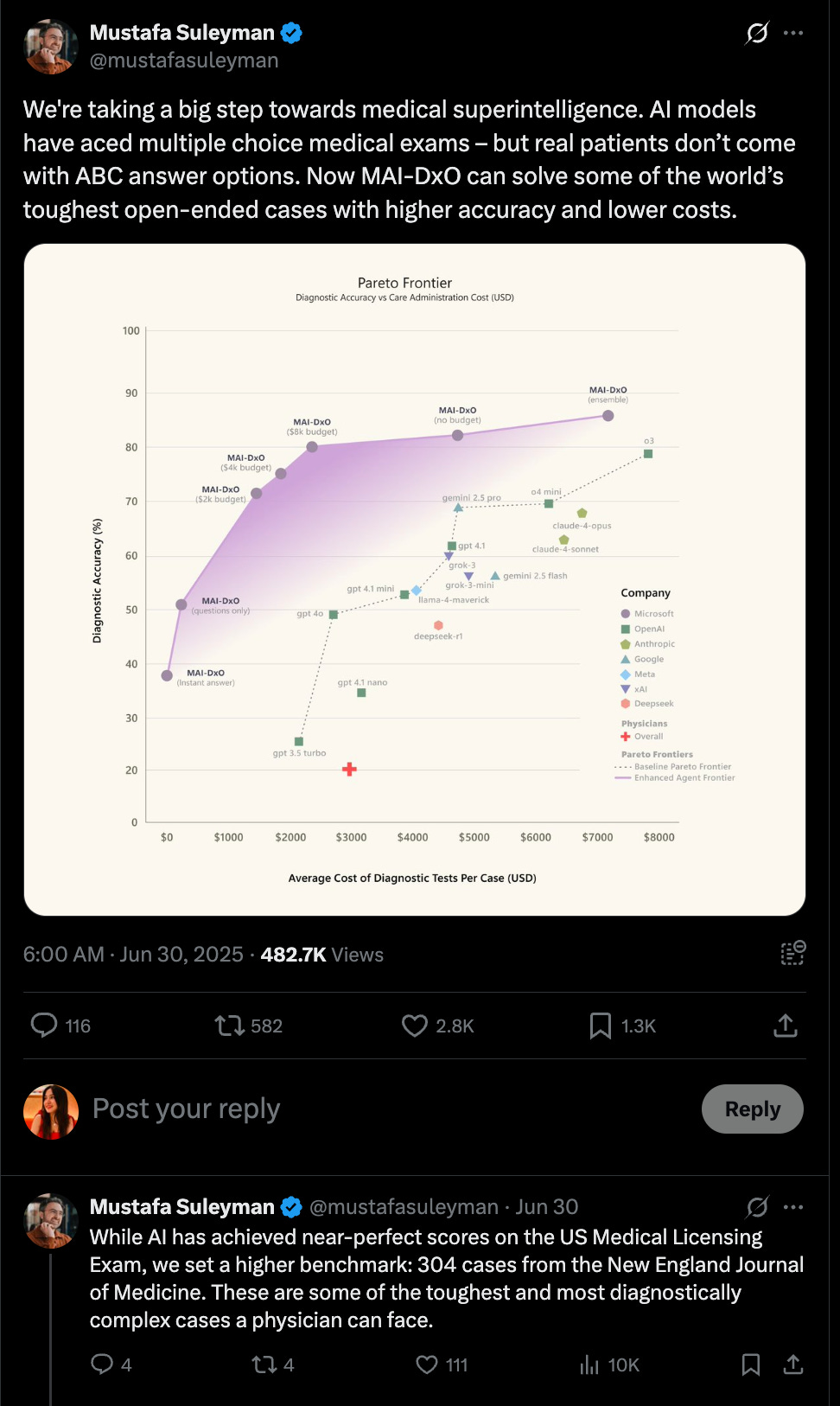Not Immortality. Just a Better Chance.
AI won’t cure death anytime soon. But it’s already beginning to change how we live, heal, and understand disease.
So here’s a story. Earlier this year, a close family member was dangerously ill in India. The diagnosis wasn’t working. The symptoms were escalating. No one knew why. I was thousands of miles away, which is not the ideal place to be when someone you love is in a hospital bed and the local medical system is throwing darts.
So I did what millions of people now do in moments of uncertainty:
I asked ChatGPT.
I typed in the symptoms, context, and history - not expecting magic, just hoping for perspective. ChatGPT came back with something eerily specific:
It could be this.
If so, check the kidneys.
If the kidneys are involved, monitor for infection.
If there’s infection in the blood, it may be sepsis. Escalate fast.
It was right. All of it.
We flagged it to the doctors. It shaped the next set of tests. And it helped turn a very bad situation around- fast.
That moment crystallized something for me. AI isn’t about replacing doctors. It’s about replacing helplessness.
With AI, care becomes continuous, not episodic. You're no longer confined to the 12-minute appointment window, the fear of asking a “dumb” question, or the limits of what you remember in the moment. You can share symptoms as they evolve, revisit context, ask follow-ups at 2am, and educate yourself along the way. It turns medicine into a dialogue, not a one-shot transaction. More than that- it turns patients into participants. Not just people who are treated, but people who understand, advocate, and act. That’s not just a UX upgrade. That’s a structural shift in how care is delivered.
There’s a lot of talk in Silicon Valley about curing death. Like, literally - curing aging, reversing entropy, building new bodies from cells that forgot they were old. To be fair, that race is very real:
Altos Labs, backed by Jeff Bezos, is reprogramming cells to reverse aging.
Retro Biosciences, funded by Sam Altman, is working on plasma exchange and cellular rejuvenation.
Calico (Alphabet) is diving deep into the mechanics of lifespan and healthspan.
And dozens more are racing to slow, pause, or even rewind the aging process
Some of this will work. Much of it will take decades. But the more immediate, life-changing breakthroughs? They’re already happening - not at the edge of life, but at the frontlines of medicine.
Just this week:
▪️Microsoft AI Diagnostic Orchestrator (MAI‑DxO) outperformed experienced physicians. It was tested on 304 real-world case studies published in The New England Journal of Medicine. These were complex cases that had stumped patients and doctors alike. MAI-DxO solved 85.5% of them. By comparison, 21 experienced physicians solved just 20%.
How? By mimicking a panel of clinical minds: One AI model orders tests, another evaluates the results, others debate, reframe, escalate. It’s a structured, chain-of-thought system modeled on real diagnostic reasoning. And it recommended fewer unnecessary tests, saving both time and cost.
Yes, it’s early. It hasn’t been deployed in hospitals. But the signal is loud: we’re not far from AI-powered co-pilots for frontline care.
▪️ DeepMind unveiled AlphaGenome, which could reshape how we study cancer, rare conditions, and inherited risk.
Genomics has long had a visibility problem. We know that most disease-related mutations don’t lie in protein-coding genes, but in the vast “dark matter” of DNA - non-coding regions that regulate gene expression. Until now, we couldn’t interpret them at scale.
AlphaGenome changes that. It can process 1 million base pairs at a time - entire genomic neighborhoods - factoring in nearby genes, enhancers, and 3D chromatin structure. In early tests, it correctly predicted how tiny, previously unreadable changes in DNA can trigger disease - like switching on cancer-related genes from outside the gene itself. It took just 4 hours to train.
If MAI‑DxO gives us a better map of what’s happening now,
AlphaGenome gives us a telescope into what might happen next.
Of course, these breakthroughs come with important caveats.
Both MAI‑DxO and AlphaGenome are still research-stage tools, not yet validated in real-world clinical settings. The MAI‑DxO study was based on retrospective case reviews, not live patient interaction, and physicians tested were operating without access to colleagues, tools, or reference material. AlphaGenome, while powerful, predicts molecular effects - it doesn’t yet translate those insights into approved treatments or patient care. And like all AI, both systems are only as good as the data, assumptions, and constraints they’re trained on.
But even with those limitations, the directional signal is clear: We’re building tools that make the hard parts of medicine - diagnosis, interpretation, prediction- more tractable, more transparent, and more widely accessible.
These tools don’t just answer questions. They reshape who gets to ask them.
This is what makes the AI revolution in medicine so powerful. Not just that it might one day extend life. But that it already extends understanding. That it gives families better odds. That it turns patients into partners - and doctors into augmented super-thinkers. And that alone could save millions of lives.
Not immortality. Just a better chance.






